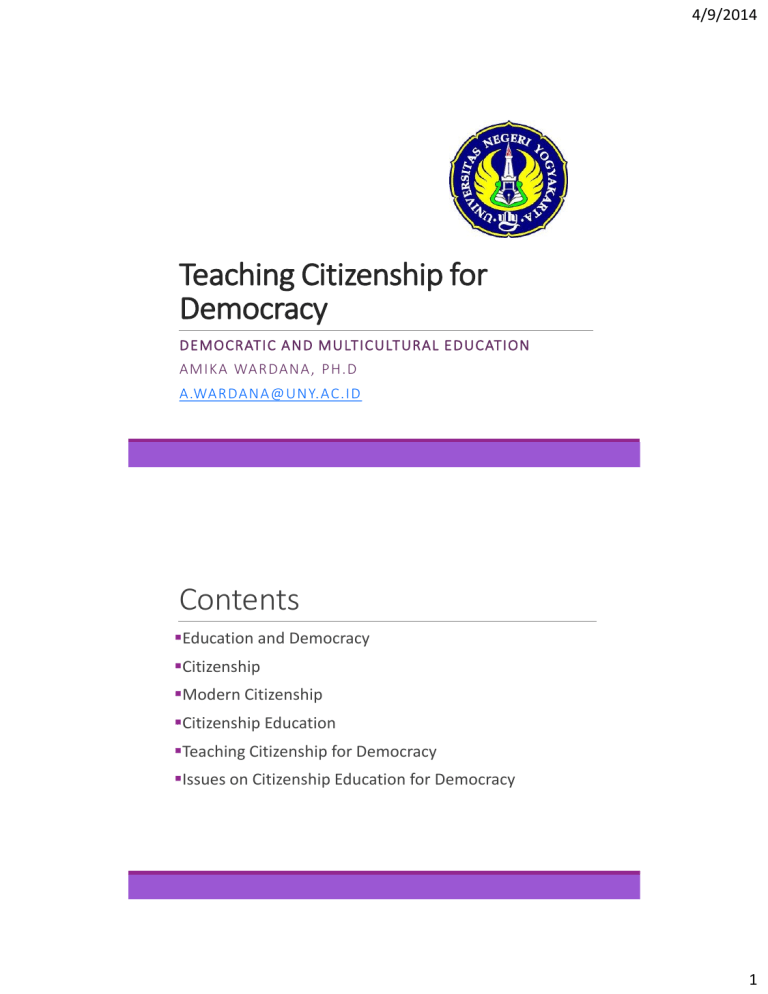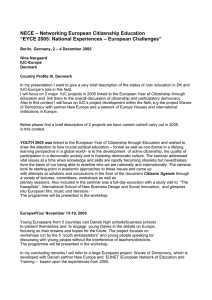Teaching Citizenship for Democracy Contents

Teaching Citizenship for
Democracy
DEMOCRATIC AND MULTICULTURAL EDUCATION
AMIKA WARDANA, PH.D
A.WARDANA@UNY.AC.ID
Contents
Education and Democracy
Citizenship
Modern Citizenship
Citizenship Education
Teaching Citizenship for Democracy
Issues on Citizenship Education for Democracy
4/9/2014
1
Education and Democracy
How education can contribute to the formation of democratic citizens; and the promotion of a democratic culture.
Two negative trends:
The decline level of political participation and political understanding; and
The decline level of Social cohesion and Integration in a given society.
4/9/2014
Citizenship
Marshall, (1950): Citizenship and Social Class
A status bestowed on all those who are full members of a community; and
All those possess the status are equal with respect to the right and duties with which the status is bestowed.
2
Citizenship Rights
Civil Rights
The rights necessarily for Individual freedom: liberty of the persons, freedom of speech, thought and faith, the right to own property, social contract, and the right of justice.
Political Rights
The rights to vote and to stand for political office.
Social R ights
The rights to a medicum of economic welfare and security; to live according the standard of the society
4/9/2014
Citizenship Rights for
Indonesians according to
Undang-Undang Dasar 1945
3
Modern Citizenship
Between Welfare State and Neo-Liberalism
Welfare state: Provide helps for who disadvantaged people in order to have equal opportunities in social/political life;
Neo-Liberalism: Welfare state provision undermines the individual freedom because of weakening personal responsibility and civic virtue.
Social Rights to Market Rights under Capitalism
Individualism and individualization: freedom to choose, freedom to own property and have them protected, freedom to spend money as one sees fit; and right to be unequal.
Responsibility and contribution to their own community/society have been largely neglected!
Political rights undermined by monetization of Capitalism!
Citizenship Education
Citizenship education is about enabling people:
to make their own decisions; and
to take responsibility for their own lives and their communities.
It is not about trying to fit everyone into the same mould, or about creating 'model' or 'good' citizens.
Democracies need active, informed and responsible citizens; citizens who are willing and able to take responsibility for themselves and their communities and contribute to the political process.
4/9/2014
4
Teaching Citizenship for
Democracy
Democracies depend upon citizens who, among other things, are:
aware of their rights and responsibilities as citizens;
informed about the social and political world;
concerned about the welfare of others;
articulate in their opinions and arguments;
capable of having an influence on the world;
active in their communities;
responsible in how they act as citizens.
Issues on Citizenship Education
First: Social and Moral
Children learning from the very beginning self-confidence and socially and morally responsible behavior in and beyond the classroom, and toward those in authority and each other.
Second: Community Involvement
Learning about and becoming helpfully involved in the life and concerns of their community.
Third: Political Literacy
Pupils learning about and how to make themselves effective in public life through knowledge, skills and values.
So, it is not just knowledge of citizenship and civic society; it also implies developing values, skills and understanding.
4/9/2014
5
Conclusion: Civic Learning
Two forms of Civic Learning:
Socialisation: the aims of civic learning in terms of the reproduction of an existing socio-political order and thus of the adaptation of individuals to the order;
Subjectification: the focus of civic learning on the emergence of political agency and so its aims in terms of the promotion of political subjectivity and agency.
4/9/2014
Further Reading
Biesta, G.JJ (211) Learning Democracy in School. and Society .
Amsterdam: Sense Publishers
Hanson, J and Howe, KR (2011) The Potential for Deliberative
Democratic Civic Education. Democracy & Education , vol 19, no- 2
Lobman, C (2011) Democracy and Development: The Role of Outsideof-School Experiences in Preparing Young People to Be Active Citizens.
Democracy & Education , vol 19, no- 1
Zamroni (2010) Pendidikan Demokrasi pada Masyarakat Multikultur .
Yogyakarta: Ombak
6






